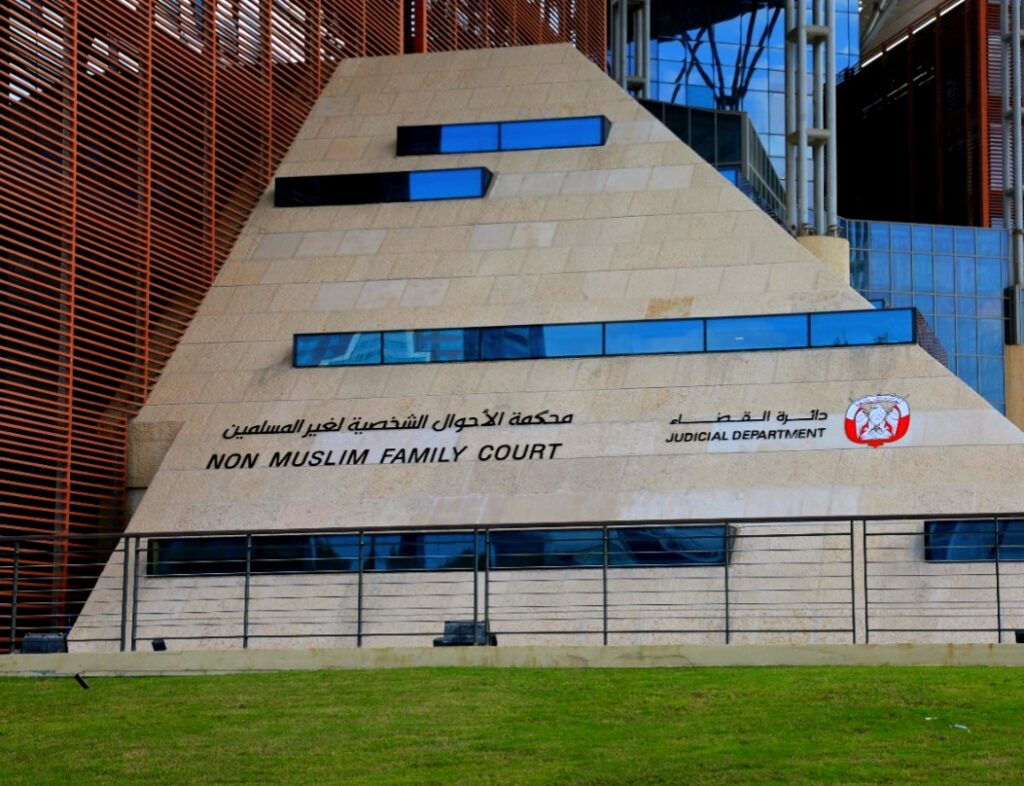Non-Muslim Family Court in Abu Dhabi
Abu Dhabi Law No. 14 of 2021 concerning Family Matters for Non-Muslims aims to apply civil principles to organize family matters inter alia, Civil Marriage, Divorce, Child Custody, Inheritance, and Paternity exclusively for non-Muslim expatriates.
The law defines an ex-patriate as a person who is not a Muslim, would it be male or female, domiciled, residing, or working in the UAE emirate of Abu Dhabi.
This article aims to enumerate the contributions of the new law, the court systems, and procedures.
The most pertinent contributions of the Law are:
Specialized Court
The specialized Court handles all Personal Status Cases for Non-Muslim Foreigners with a single judge who may be a non-Muslim and the procedures of which shall be in English and Arabic.
Principle of Equality
Article 16 of the Law affirms that, while implementing the provision of this law, equality between men and women in the rights and obligations shall be taken into consideration, especially in testimony, inheritance, right of divorce, and joint custody.
The other main contributions are related to marriage, divorce, custody, alimony and financial rights, and Inheritance and wills.
Civil Marriages
Article 7 of Resolution [Resolution of Chairman of the Judicial Department No. (8) of 2022, concerning the Marriage and Civil Divorce Procedures in the Emirate of Abu Dhabi] defines: “Marriage is deemed civil if it is conducted and registered by-laws and regulations without regard to any specific religious law.”

Other conditions to be fulfilled:
- The minimum age prescribed for marriage is 18.
- Both parties shall have the free will and sound mental capacity.
- Polygamy and marriage within a close blood relationship are prohibited.
Article 8 exempts the applicants from the medical examination, and witnesses are also not required for concluding the marriage.
The initial steps of filling up the form of marriage and its submissions along with prescribed fees are 100% digital, and once the digital application of marriage is approved within three working days, a date will be scheduled for issuance of the marriage certificate. A bilingual marriage certificate will be saved in the electronic civil marriage registry.
Civil Divorce
Article 10 of Resolution defines: “Divorce is considered civil if the spouses separated by a court ruling by the laws and regulations without regard to any specific religious law.”
The objectives of the Law emphasize the protection of children of separated parents and defines the role of the mother and the father in the post-Divorce phase. The law further aims to reduce the disputes and quarrels resulting from divorce.
It prescribes detailed provisions and procedures for ‘unilateral’ or ‘no-fault divorce’ which gives liberty to one of the spouses to declare before the Court his/her willingness for separation and for ending the marital relationship without demonstrating any damage or to blame the other party.
Further, it excludes the divorce applicants from being considered by family guidance committees, hence the divorce applications under the Law will be directly referred to the Court to issue a judgment.
Joint Custody
Joint custody has been defined as the equal and shared right and responsibility of the father and the mother in raising the children unless one of them opts to waive such a right in writing. This is to mitigate the repercussions of Divorce on the child and to maintain his/her mental health. Any party may request the court’s interference anytime to settle any disputes arising from custodial rights. Custody rights are assigned only until the child reaches 16.
Alimony and other Financial Rights
Article 8 of the Resolution lays down the mechanism or criteria based on which the alimony and other financial rights after divorce are calculated. This includes:
- The total years of marriage
- The age of the wife, [the age affects the alimony payment; a young wife gets a low alimony amount, and vice-versa.]
- The economic status of spouses based on an expert report
- The extent to which the husband contributed to the Divorce
- Whether or not the wife takes care of the children or not
- The financial damages that affect any spouse due to unilateral damage. Any spouse shall compensate the other for any material or moral damage resulting from the Divorce.
Further, it vests the liability to compensate the spouse who may undergo material or moral damage from the Divorce. In addition, it obligates the father to pay the custody expenses and costs to the mother during joint custody for a temporary period [not exceeding 2 years] which will be decided based on an expert report.
Inheritance and Wills
Article 11 of the Law confirms the right of non-Muslim expatriates to register their will. However, it lays down the procedures in the absence of a Will. It states that, if a non-Muslim expatriate passes away without leaving a will, half of the assets will go to the spouse and the other half will be distributed among children in equal shares. In the absence of children, the said portion will go to parents and if parents are not alive, then such portion will be equally shared among the siblings.
The law has been issued to take a pioneering initiative in the Emirate for the issuance of the first civil law regulating the family matters of foreigners, according to the international best practices. Indeed, it provides the non-Muslim expatriates a choice of law and jurisdiction, and no doubt it is a giant step that brings an international character to the personal status law.
“The Article published herein, does not, constitute a legal advice; and does not intend to impart any legal advice; instead, all information, content, and materials available on this site are for general informational purposes only”

